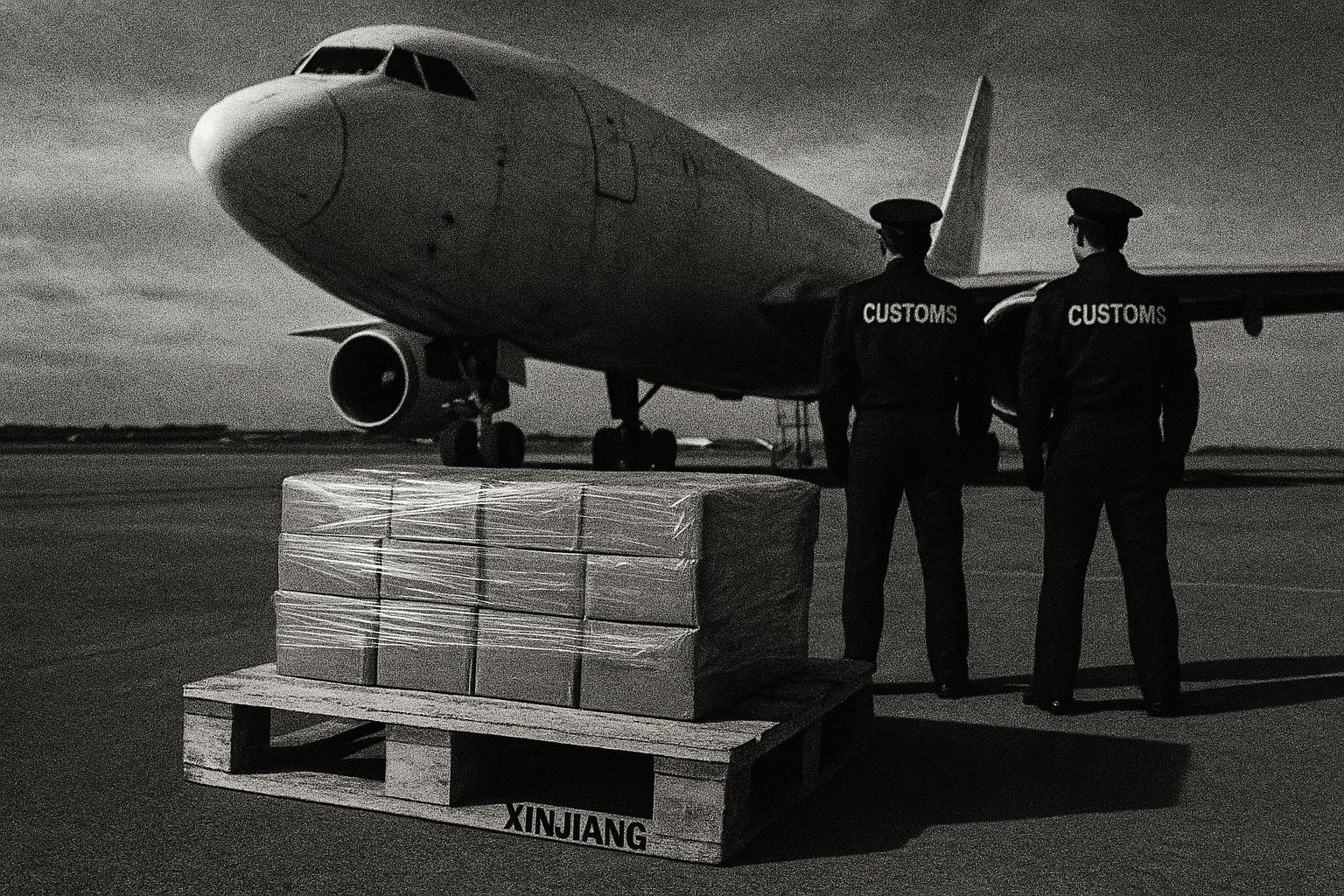Research released this year has prompted fresh warnings that Britain could become a dumping ground for goods tainted by forced labour after a rapid expansion of direct air‑cargo links between the Xinjiang Uygur Autonomous Region and European destinations. According to analysis published by the Uyghur Human Rights Project, new freight services launched since June 2024 have created direct corridors from Ürümqi to cities including London, Bournemouth and Cardiff, a pattern also reported in coverage of the research.
The UHRP’s Manifest Risk report — which examined historical cargo‑flight records — found that nine cargo operators opened routes to the EU, the UK and Switzerland and that, as of May 2025, more than 40 weekly flights were carrying goods from Xinjiang to Europe. The analysis identifies high‑risk commodities on those services, including textiles, footwear, electronics and agricultural products, and describes a nascent “Air Silk Road” moving thousands of tonnes of freight into European markets.
Those commercial findings sit against a broad body of international reporting and analysis of rights abuses in Xinjiang. The Council on Foreign Relations summarises decades of evidence — leaked documents, satellite imagery and witness testimony — showing mass detention, pervasive surveillance and widespread restrictions on religion and culture, and notes that several governments and experts characterise the measures as amounting to genocide or crimes against humanity, with systematic forced labour recorded as part of that pattern.
The prospect of increased cargo flows into the UK has already become a matter of parliamentary concern. David Alton, chair of Parliament’s Joint Committee on Human Rights, told Politico he was “deeply concerned” by the findings and warned the UK risks being used as an alternative market. Parliamentary records show peers raising the same alarm in the Lords Chamber, including pointed questions about why Border Force does not routinely assess arriving freight for links to forced labour and calls for tougher import controls. Government replies recorded in Hansard indicate there have been no plans to restrict commercial cargo operations to date.
Campaigners and industry watchdogs have urged immediate action. Luke de Pulford of the Inter‑Parliamentary Alliance on China told the Daily Mail that since the United States passed laws barring Uyghur slave‑made goods from its market, “Beijing has been scrambling to dump them elsewhere”, and said the UK must impose import restrictions on goods from Xinjiang. Sian Lea, head of UK and European advocacy at Anti‑Slavery International, argued that authorities should “presume all products made in the Uighur region are made with forced labour.” Anti‑Slavery International also pointed to a recent Court of Appeal victory to underline that companies face real legal risk if they continue to profit from goods made with forced labour and urged the UK to close enforcement gaps.
There is precedent overseas for the stronger position being proposed. The United States’ Uyghur Forced Labor Prevention Act creates a rebuttable presumption that any goods wholly or partly produced in the Xinjiang region are made with forced labour and therefore prohibited from entering U.S. markets unless proven otherwise; the U.S. Department of Labor and interagency task forces maintain an Entity List and guidance to help businesses perform robust due diligence. UK parliamentary debate and campaigners’ statements suggest there is no directly equivalent, comprehensive UK legislative regime in force today.
Beijing rejects the underlying premise of the research. A spokesperson for China’s embassy in London told the Daily Mail that allegations of forced labour in Xinjiang were a “lie of the century” and described such reporting as smear tactics by “anti‑China elements”, adding that Xinjiang’s products were “high‑quality and widely welcomed” and pointing to what the embassy called the region’s steady economic and social progress. That denial sits alongside the international corpus of evidence and the legal and policy responses being pursued elsewhere.
Experts and campaign groups are therefore calling for a package of measures to blunt the perceived risk: treating the Uyghur Region as high‑risk in customs screening, greater transparency from government about import flows, mandatory human‑rights due diligence for companies, targeted import restrictions and more resourcing for enforcement. The UHRP explicitly urged EU and UK authorities to disclose import data and impose stronger controls to prevent forced‑labour products entering markets; reporting has also urged customs agencies to bolster screening and policing of freight corridors.
The tension between expanding commercial air connectivity and the human‑rights concerns it raises is now unambiguously political as well as technical. Unless the UK adopts clearer, enforceable safeguards — and unless industry and customs authorities increase transparency and scrutiny along these new routes — campaigners warn the rapid growth in air freight could shift the problem rather than solve it, moving goods out of one tightly regulated market and into another. For ministers, businesses and customs officials the immediate test is whether policy and enforcement can keep pace with the burgeoning flows of cargo that research says originate in a region where forced‑labour risk is widely documented.
📌 Reference Map:
##Reference Map:
- Paragraph 1 – [1], [2], [3]
- Paragraph 2 – [2], [3], [1]
- Paragraph 3 – [4]
- Paragraph 4 – [1], [3], [7]
- Paragraph 5 – [1], [6]
- Paragraph 6 – [5], [7]
- Paragraph 7 – [1]
- Paragraph 8 – [2], [3], [6]
- Paragraph 9 – [2], [6], [7], [5]
Source: Noah Wire Services
